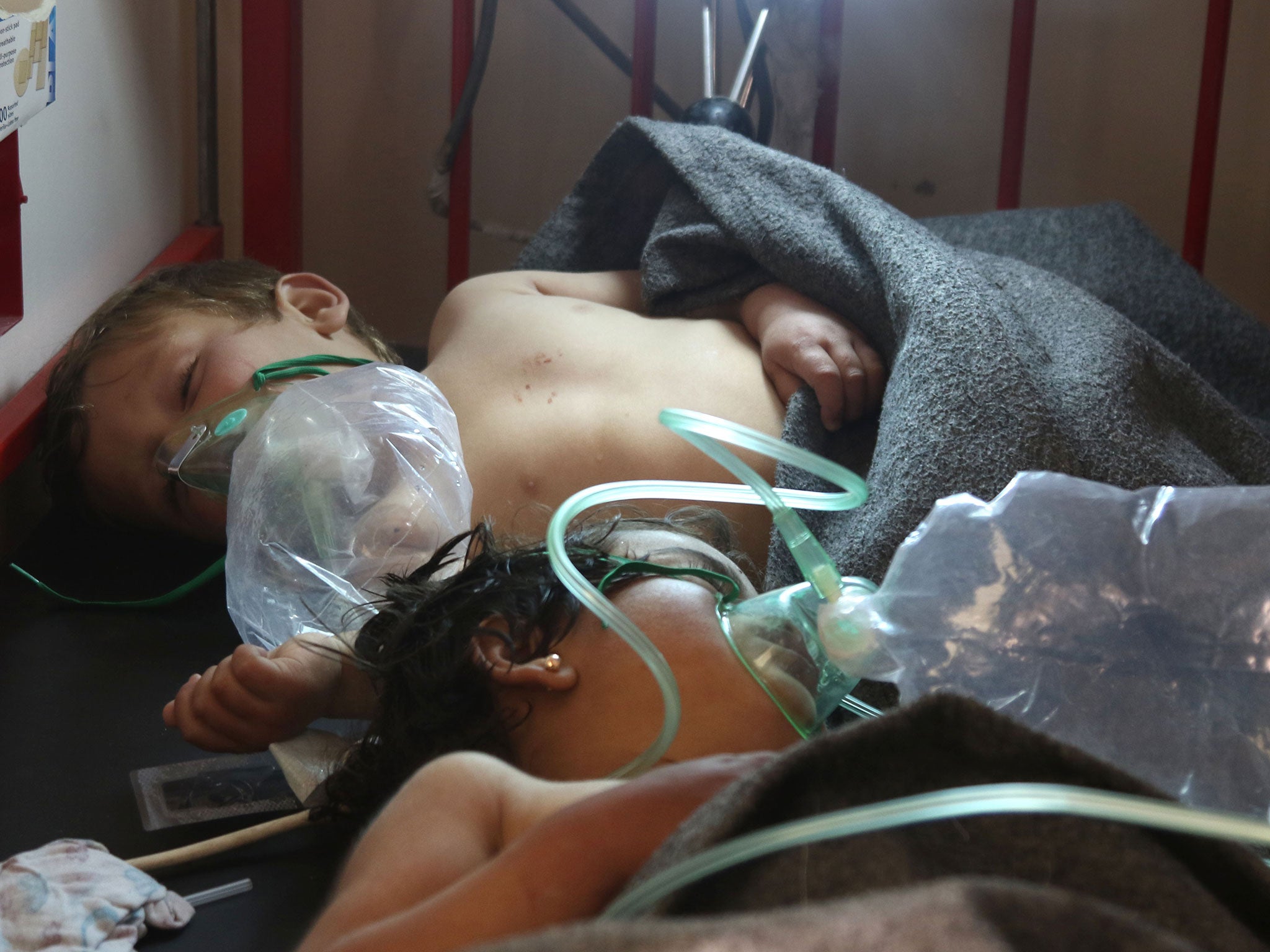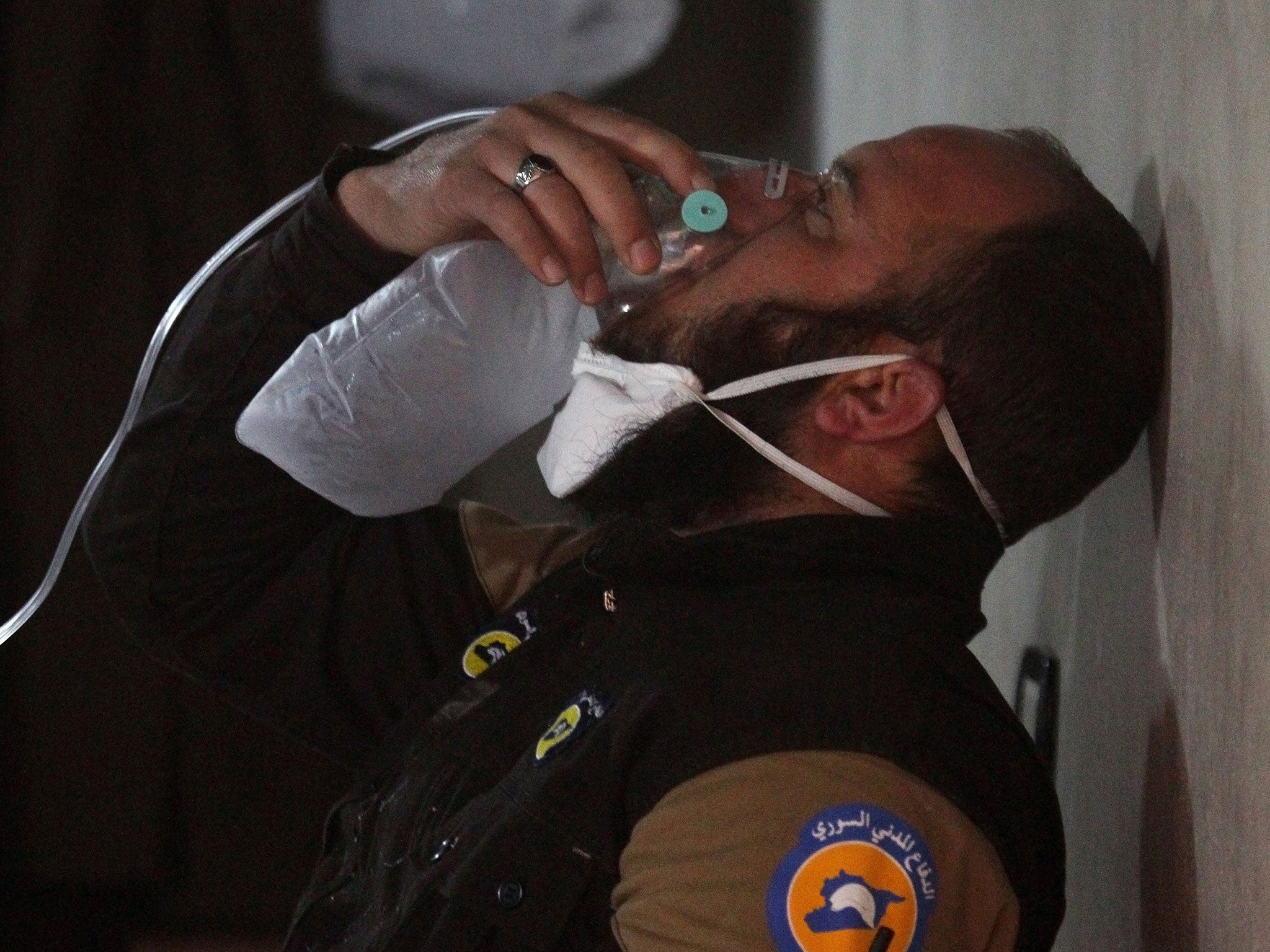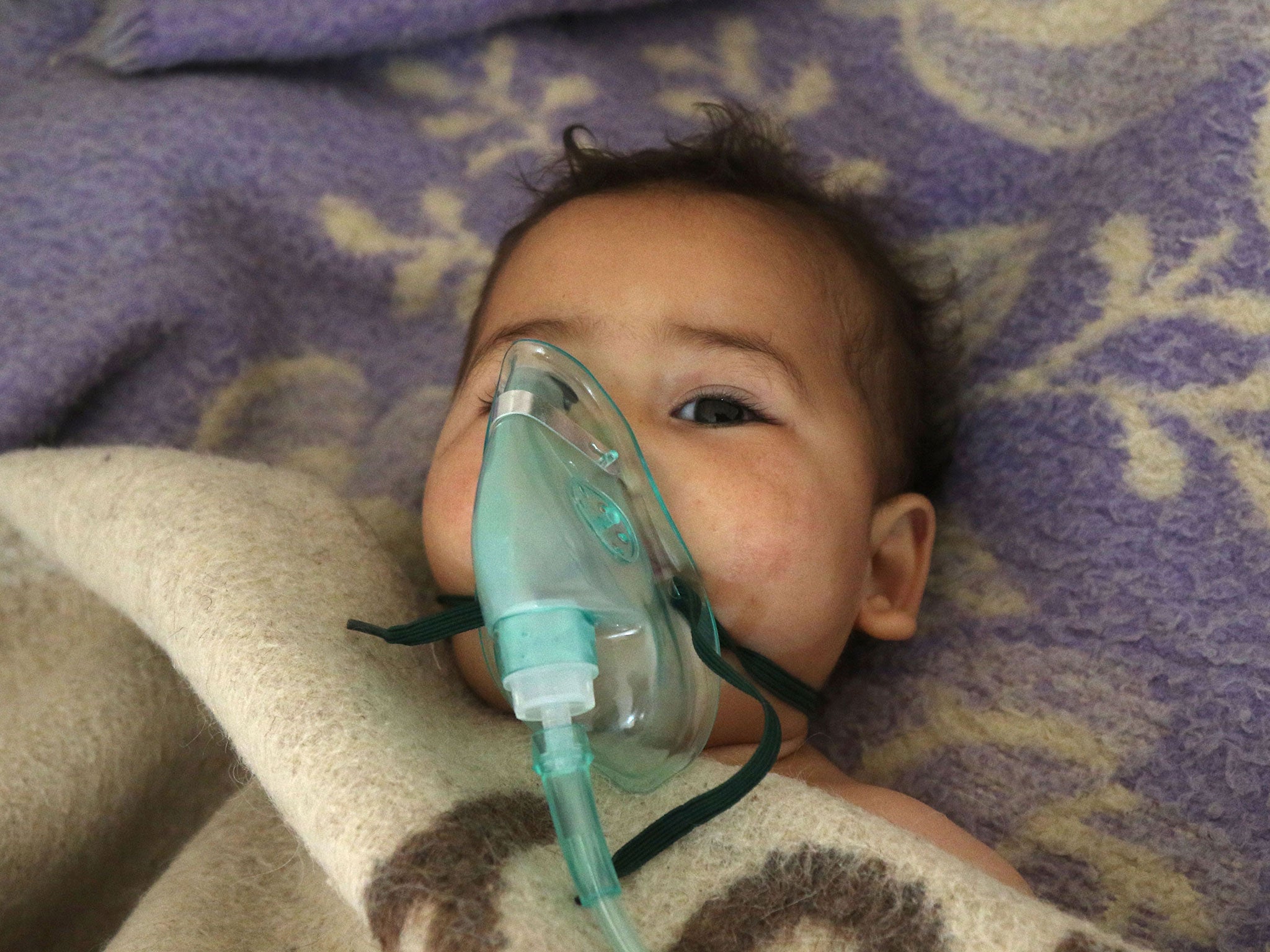Idlib chemical weapons attack: Hospitals treating patients for 'toxic gas' exposure bombed in Syria
Attacks come as world leaders prepare to meet in Brussels for UK-hosted Syria conference

Your support helps us to tell the story
From reproductive rights to climate change to Big Tech, The Independent is on the ground when the story is developing. Whether it's investigating the financials of Elon Musk's pro-Trump PAC or producing our latest documentary, 'The A Word', which shines a light on the American women fighting for reproductive rights, we know how important it is to parse out the facts from the messaging.
At such a critical moment in US history, we need reporters on the ground. Your donation allows us to keep sending journalists to speak to both sides of the story.
The Independent is trusted by Americans across the entire political spectrum. And unlike many other quality news outlets, we choose not to lock Americans out of our reporting and analysis with paywalls. We believe quality journalism should be available to everyone, paid for by those who can afford it.
Your support makes all the difference.Children are among dozens of civilians killed in what is feared to be the worst chemical weapons attack in Syria in almost four years.
Hospitals treating victims of a suspected toxic gas were themselves targeted in a series of air strikes following the atrocity in a rebel-held town in Idlib province, where activists claimed up to 100 people died.
United Nations war crimes investigators have launched a probe into both rounds of bombing, saying the use of chemical weapons or deliberate targeting of medical facilities “would amount to war crimes and serious violations of human rights law”.
At least 58 people including 11 children were reported dead after the initial attack on the rebel-held town of Khan Sheikhoun, which came during a Brussels conference on ending the Syrian conflict.
Theresa May said she was “appalled” by the attack and called for an investigation.
Doctors said victims started to choke, vomit and faint with foam coming out of their mouths, showing symptoms of possible sarin gas exposure.
Pin-point pupils and a lack of the odour associated with more commonly used chlorine gas were among the evidence cited for the nerve agent, which is banned as a weapon of mass destruction under international law.
The UK-based Syrian Observatory for Human Rights said women and children were among dozens killed, with reports of “suffocation” following the bombings.

It put the death toll at 58 but warned the number could rise as several victims remained in a serious condition, and estimates by local medical groups ranged up to 100 killed.
Mohammed Hassoun, a media activist in nearby Sarmin, said Khan Sheikhoun’s hospital was unable to cope with the number of casualties, seeing them distributed around Idlib province.
“There are 18 critical cases here,” he said. “They were unconscious, they had seizures and when oxygen was administered, they bled from the nose and mouth.
“Chlorine gas doesn't cause such convulsions.”
Hussein Kayal, a photographer for the pro-opposition Idlib Media Centre, said he was awoken by the sound of a bomb blast around 6.30am local time (4.30am BST).
When he arrived at the scene there was no smell, he added, finding entire families inside their homes, lying on the floor with their eyes wide open but unable to move.
Mr Kayal said he wore a mask to take the victims to hospital, removing their clothes and washing them in water, but was treated for a burning sensation in his fingers.

Turkey opened its border crossing at Reyhanli to allow victims through for treatment, with graphic footage showing convulsing and choking patients being doused with water and loaded into ambulances.
The bodies of around a dozen young children were seen being laid out on blankets in a flat-bed truck, with toddlers among those being given oxygen in clinics overflowing with patients.
Rescue workers from the White Helmets group wore gas masks to protect themselves while treating people lying amid rubble on the ground, with some having to receive treatment for chemical exposure themselves.
Activists posted video online claiming to show the moment the bombs struck, alleging they were dropped by Syrian air force aircraft as clouds of smoke rose into the air.
Hours afterwards, clinics treating the victims were themselves hit by suspected rocket attacks from fighter jets.
A journalist from the AFP news agency said a strike brought rubble down on medical staff treating patients at Khan Sheikhoun’s main hospital.
Footage showed a reporter speaking to a camera as doctors worked, before an explosion threw him to the floor and the screen blacked out.
The Syrian Civil Defence rescue group said two of its centres were targeted by air strikes – one in Khan Sheikhoun and one in nearby Habit.
The group said none of its volunteers were injured but the damage put the facilities temporarily out of service.
It came little over a week after another alleged chemical attack hit a hospital in the town of Latamneh, just 14 miles away.
Médecins Sans Frontières (MSF), which supports the facility, said a bomb dropped by a helicopter struck the entrance on 25 March.
“Immediately after the impact, patients and staff reported suffering severe respiratory symptoms and burning of mucous membranes – symptoms consistent with an attack using chemicals,” a spokesperson said.
Over the past year, the charity has received reports of at least 71 attacks on 32 different health facilities it runs or supports in Syria.
Staffan de Mistura, the UN special envoy for Syria, said a UN Security Council meeting would be held on the latest attack as agencies are activated to discover “precisely” what occurred in Khan Sheikhoun.
“We understand it was a chemical attack and it came from the air,” he told a press conference in Brussels.
“What happened this morning is horrific. The UN is going to ask for the clear identification of responsibility and accountability.”
Mr de Mistura noted the timing of the attack amid the Brussels conference and peace talks in Astana and Geneva, where he said “incremental improvements” had been achieved.

“Every time we have a moment in which the international community is capable of being together, there is someone, somehow, that tries to undermine that feeling of hope by producing a feeling of horror and outrage,” he added.
“We are not going to give up.”
Ms May said the attack, "if proven, will be further evidence of the barbarism of the Syrian regime”.
"I'm very clear that there can be no future for Assad in a stable Syria which is representative of all the Syrian people and I call on all the third parties involved to ensure that we have a transition away from Assad,” she said.
"We cannot allow this suffering to continue."
Foreign Secretary Boris Johnson said the attack bore “all the hallmarks” of Bashar al-Assad’s government, which has repeatedly used chemical weapons.
“If this were proved to have been committed by the Assad regime, then it would be another reason to think they are an absolutely heinous outfit, it is a war crime,” he said.
“Bombing your own civilians with chemical weapons is unquestionably a war crime and they must be held to account.”
The Syrian military denied deploying chemical weapons at Khan Sheikhoun or in any other incident, despite a series of international investigations concluding it was responsible for a series of such attacks, while Isis has also used mustard gas.
There was no immediate comment from Donald Trump but the White House spokesman, Sean Spicer, condemned “heinous actions by the Assad regime”.
He claimed the atrocity was a “consequence of the last administration’s weakness and irresolution”, without outlining what action the new administration would take.
French President François Hollande denounced the incident, comparing it to the regime’s sarin attack on Ghouta that left hundreds dead in 2013, which almost sparked military intervention by the UK.

“Once again, the Syrian regime will deny evidence of its responsibility for this massacre,” he said.
“As in 2013, Bashar al-Assad counts on the complicity of his allies to benefit from intolerable impunity.
“Those who support the regime should consider the extent of their political, strategic and moral responsibility.”
France called for an emergency UN Security Council meeting over the massacre, while Turkish President Recep Tayyip Erdogan told the Russian leader Vladimir Putin “such inhumane attacks are unacceptable” during a phone call.
Russian forces are backing the Syrian government with air strikes against Isis and rebel groups but the defence ministry denied any involvement in Tuesday's attacks.
Assad's forces have been accused of repeatedly using chemical weapons including sarin during the six-year civil war.
A report by the Organisation for the Prohibition of Chemical Weapons (OPCW) released last year concluded that Syrian government forces were responsible for three examined chemical attacks but China and Russia have vetoed sanctions.
Matthew Rycroft, the British ambassador to the UN, urged Mr Assad’s allies not to use their vetoes to “defend the indefensible” and let those responsible for the latest atrocity be held to account.
The OPCW said it was “seriously concerned” about reports emerging from Khan Sheikhoun and was gathering and analysing evidence, following “persistent allegations” of illegal chemical weapons use in Syria.
Idlib province, in north-western Syria, is a key battleground between regime forces and rebels including an alliance of Islamist factions linked to al-Qaeda.
It was the destination for rebel fighters evacuated from eastern Aleppo earlier this year, and is widely expected to be Assad's next major target.
Khan Sheikhoun sits near the frontline between regime and opposition-held territory, on a strategic motorway linking the city of Hama with rebel strongholds to the north.
The apparent chemical attack came as world leaders gathered in Brussels for a conference co-hosted by the UK on “supporting the future of Syria”.
Successive rounds of peace talks in Geneva and Astana have so far failed to produce a lasting ceasefire in the Syrian conflict, which shows no sign of ending in its seventh year of bloodshed.
Extremist groups including Isis are not part of the talks, with Isis’s new spokesman Abu Hassan al-Muhajir calling for a “global war” against enemies including the US, Europe and Russia in a new speech.
Join our commenting forum
Join thought-provoking conversations, follow other Independent readers and see their replies
Comments